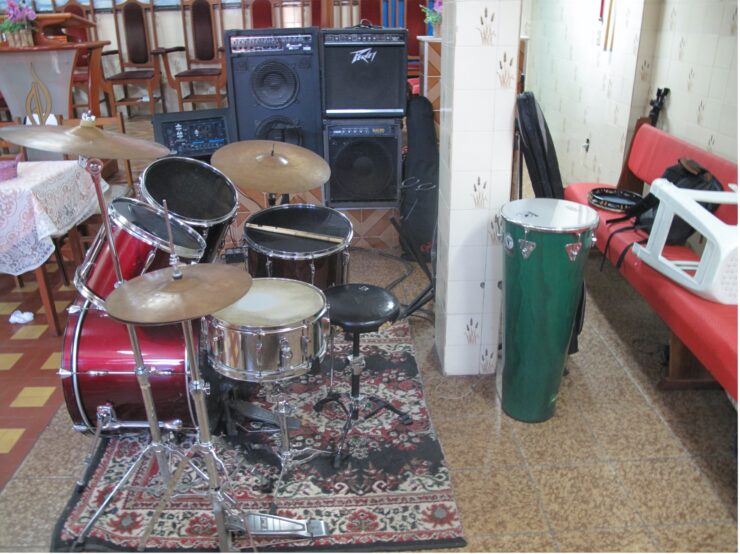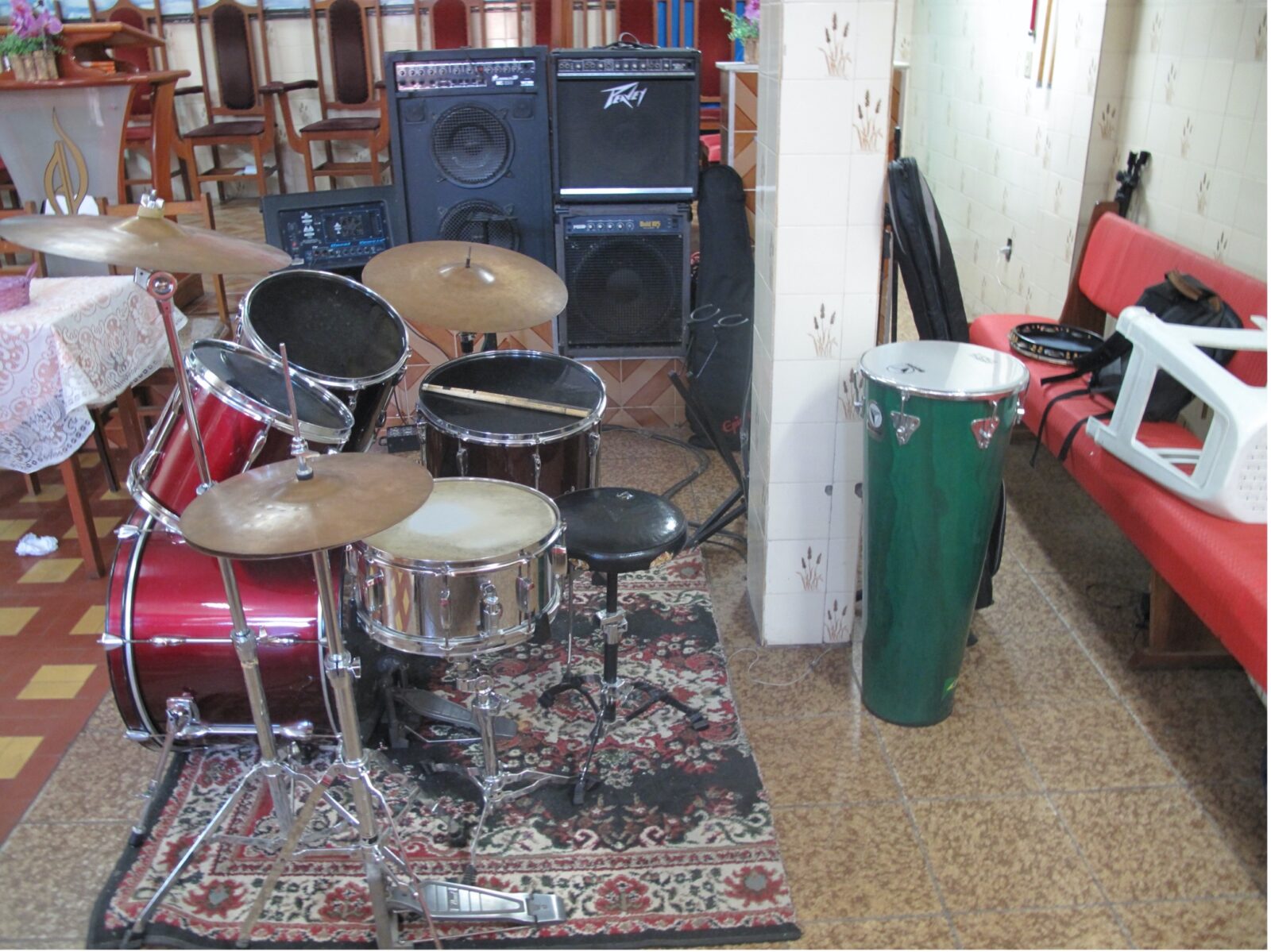Blog
Creative Urban Methods: Musicking and Improvisation in Ethnographic Research
Martijn Oosterbaan
When I started my fieldwork on the boom of Pentecostal churches in Rio de Janeiro, Brazil, I was convinced I would need to catch up on my knowledge of the Bible and would likely be spending much time in Bible-studies groups with recently converted church-members. However, I quickly found out that understanding why inhabitants of the favela of my research drastically altered their way of life and accepted Jesus as Savior, required a variety of senses and involved much more than reading. As I discovered, Brazilian Pentecostalism involves ecstatic participation in bodily routines ranging from singing, shouting, crying, dancing and shaking. Confronted by my initial inability to access these embodied domains of the spirit-infused world, I sought connection by way of the thing I did understand somewhat: music. When I discovered that one of the church bands was lacking a drummer, I humbly volunteered to play along. After the pastor’s approval, I regularly played with the band during Friday night church-services.
Music and people’s bodily engagement with music are very important features of global Pentecostalism (Cox 1995; Hackett 1998; Ingalls and Yong 2015; Martin 2002; Meyer 2010; Miller and Yamamori 2007). Pentecostal church services and other devotional practices are regularly accompanied by ‘musicking’: the diverse practices of making and listening to music (Small 1999). Congregants in the favela of my research sang hymns in church and they habitually responded to songs, shouting out hallelujahs during a performance while the 6/8 beat, common to many gospel ballads, would reach climatic heights. In domestic settings, I observed listeners moved by the rhythmical flow of recorded songs and I saw people joyfully practicing their instrument.

Percussion instruments in a Pentecostal Church in Rio de Janeiro, Brazil
Participant observation – the cornerstone of ethnographic research – is deeply improvisational. As Liisa Malkki (2007) stresses, improvisation does not mean that one arrives in the field unprepared, however. Building on a homology between doing ethnographic research and performing Jazz music, Malkki explains how ethnographic research requires years of training of different kinds of techniques that allows one to improvise (learning languages, knowing historical contexts, understanding conversational techniques, etc.). Without such preparation, improvisation would not be successful. While I wholeheartedly agree, I also want to add some reflections to Malkki’s insights:
Firstly, in some cases (as in mine), ethnographic improvisation is not just homologous to musical improvisation but profoundly entangled with it. I do not mean to suggest that my drumming came near to the excellence of professional Jazz musicians. My modest skills allowed me to participate in musical improvisation, which in turn gave me a chance to co-produce and co-experience some of the affective elements central to Pentecostalism. The church band that I played with generally did not rehearse but improvised during a service, building on their shared familiarity with popular gospel songs. The chords and rhythms of these gospel songs showed striking resemblance with those of globally circulating pop-ballads (which I knew from listening to Whitney Houston’s greatest hits in my teens). Conversing with the other musicians by way of musicking gave me some insights what they and the audience sought in a church service.
Secondly, improvisation in ethnographic fieldwork also goes beyond the homology with Jazz performance. One cannot know before arriving at a research site exactly if and what one should learn (or should have learned) to be able to participate and which skills and techniques (beyond musical) are required to access the domains of knowledge one wants to include in a research. I had learned to play the drums as an adolescent and had played in a school band for a short while but I did not prepare for fieldwork by taking extra lessons or so because I did not know beforehand what kind of techniques might be needed. As Malkki also stresses, much of the learning takes place in the field. In practice, this means that during ethnographic research, one frequently seeks ways to build on known techniques, which, by way of improvisation, can be modified or extended as part of ongoing efforts to connect to the life worlds of the persons we engage with and want to learn from.
References
Cox, Harvey. 1995. Fire from Heaven: The Rise of Pentecostal Spirituality and the Reshaping
of Religion in the Twenty-First Century. Cambridge, Mass.: Da Capo Press.
Hackett, Rosalind I. J. 1998. “Charismatic/Pentecostal Appropriation of Media Technologies
in Nigeria and Ghana.” Journal of Religion in Africa 28(3): 258–77.
Howard, Jay R. and John M. Streck. 1999. Apostles of Rock: The Splintered World of
Contemporary Christian Music. Lexington: University Press of Kentucky.
Ingalls, M. and Yong A. (eds.). The Spirit of Praise: Music & Worship in Pentecostal-
Charismatic Christianity. Philadelphia: Penn State University Press.
Martin, David. 2002. Pentecostalism: The World Their Parish. Malden, Mass.: Blackwell.
Meyer, Birgit. 2010. “Pentecostalism and Globalization.” In Studying Global Pentecostalism:
Theories and Methods, edited by Allan Anderson, Michael Bergunder, André Droogers, and Cornelis van der Laan, 113–130. Berkeley: University of California Press.
Malkki, Liisa. 2007. “Tradition and Improvisation in Ethnographic Field Research.” In
Improvising Theory: Process and Temporality in Ethnographic Fieldwork, edited by Cerwonka, Allaine, and Liisa H. Malkki, 162-187. Chicago: University of Chicago Press.
Miller, Donald E., and Tetsunao Yamamori. 2007. Global Pentecostalism: The New Face of
Christian Social Engagement. Berkeley: University of California Press.
Small, Christopher. 1999. “Musicking – The Meanings of Performing and Listening. A
Lecture.” Music Education Research, 1(1): 9-22.

